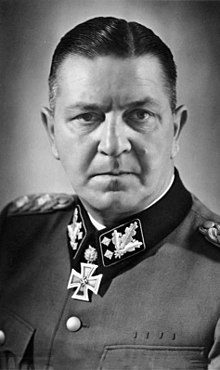Theodor Eicke
| Theodor Eicke | |
|---|---|
 |
|
| Born | 17 October 1892 Hudingen, German Empire |
| Died |
26 February 1943 (aged 50) near Kharkov, Soviet Union |
| Allegiance | |
| Service/branch |
Bavarian Army |
| Years of service | 1909–19 (Bavaria) 1930–1943 (SS) |
| Rank | Obergruppenführer |
| Service number |
NSDAP #114,901 SS #2,921 |
| Unit | SS-Totenkopfverbände |
| Commands held |
Dachau concentration camp SS Division Totenkopf |
| Battles/wars | |
| Awards | Knight's Cross of the Iron Cross with Oak Leaves |
Theodor Eicke (17 October 1892 – 26 February 1943) was a high-ranking commander in the SS of Nazi Germany. He commanded the Dachau concentration camp and the SS Division Totenkopf of the Waffen-SS.
Eicke was one of the key figures in the establishment of concentration camps in Germany. Together with his adjutant Michael Lippert, Eicke executed SA Chief Ernst Röhm during the Night of the Long Knives purge in 1934.
Eicke, the son of a station master, was born in Hudingen (Hampont), near Salzburg (Château-Salins) (then in the German province of Elsass-Lothringen) into a lower-middle-class family. The youngest of 11 children, he did not do well in school and dropped out at the age of 17 before graduation. He joined the 23rd Bavarian Infantry Regiment as a volunteer; later on, in World War I, he took the office of paymaster for the 3rd — and, from 1916 on, the 22nd Bavarian Infantry Regiment. He won the Iron Cross, Second Class in 1914.
Eicke resigned from his position of army paymaster in 1919. He began studying in his wife's hometown of Ilmenau. However, he dropped out of school again in 1920 intending to pursue a police career. He initially worked as an informer and later as a regular policeman. His career in the police came to an end because of his fervent hatred for the Weimar Republic and his repeated participation in violent political demonstrations. He finally managed to find work in 1923 at IG Farben.
...
Wikipedia
